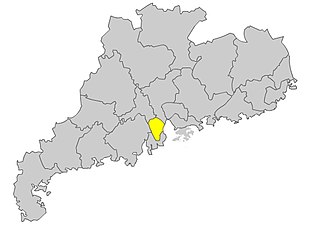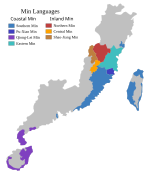Nanlang dialect: Difference between revisions
Appearance
Content deleted Content added
ce |
znl rejected |
||
| (15 intermediate revisions by 10 users not shown) | |||
| Line 1: | Line 1: | ||
{{Short description|Eastern Min dialect of Guangdong, China}} |
|||
{{Infobox language |
{{Infobox language |
||
| name = Nanlang |
|||
|name=Nanlang dialect |
|||
|nativename= |
| nativename = ''Namlong'' |
||
| altname = 南蓢話 |
|||
|states=[[China]] |
| states = [[China]] |
||
|region=Mainly in [[Nanlang]], southern [[Guangdong]] province. |
| region = Mainly in [[Nanlang]], southern [[Guangdong]] province. |
||
|speakers=? |
| speakers = ? |
||
|familycolor=Sino-Tibetan |
| familycolor = Sino-Tibetan |
||
|fam2=[[Varieties of Chinese|Chinese]] |
|||
| fam2 = [[Sinitic languages|Sinitic]] |
|||
|fam3=[[Min Chinese|Min]] |
|||
| fam3 = [[Chinese language|Chinese]] |
|||
|fam4=[[Southern Min]] |
|||
| |
| fam4 = [[Min Chinese|Min]] |
||
| fam5 = [[Min Chinese#Coastal Min|Coastal Min]] |
|||
| ⚫ | |||
| fam6 = [[Eastern Min]] |
|||
| ⚫ | |||
| fam7 = ([[Zhongshan Min]]) |
|||
| ⚫ | |||
| ancestor = [[Proto-Sino-Tibetan language|Proto-Sino-Tibetan]] |
|||
| ⚫ | |||
| ancestor2 = [[Old Chinese]]{{efn|name=minClassification|Min is believed to have split from Old Chinese, rather than Middle Chinese like other varieties of Chinese.<ref>{{citation |last=Mei |first=Tsu-lin |author1-link=Mei Tsu-lin |title=Tones and prosody in Middle Chinese and the origin of the rising tone |journal=Harvard Journal of Asiatic Studies |volume=30 |year=1970 |pages=86–110 |doi=10.2307/2718766 |jstor=2718766}}</ref><ref>{{citation |last=Pulleyblank |first=Edwin G. |author-link=Edwin G. Pulleyblank |title=Middle Chinese: A study in Historical Phonology |year=1984 |page=3 |location=Vancouver |publisher=University of British Columbia Press |isbn=978-0-7748-0192-8}}</ref><ref name="glottoMin">{{Cite journal |url=https://glottolog.org/resource/languoid/id/minn1248 |title=Glottolog 4.8 - Min |date=2023-07-10 |access-date=2023-10-13 |website=[[Glottolog]] |last1=Hammarström |first1=Harald |archive-url=https://web.archive.org/web/20231013171747/https://glottolog.org/resource/languoid/id/minn1248 |archive-date=2023-10-13 |url-status=live |publisher=[[Max Planck Institute for Evolutionary Anthropology]] |author-link=Harald Hammarström |last2=Forkel |first2=Robert |publication-place=[[Leipzig]] |doi=10.5281/zenodo.7398962 |last3=Haspelmath |first3=Martin |author-link3=Martin Haspelmath |last4=Bank |first4=Sebastian |doi-access=free}}</ref>}} |
|||
| ⚫ | |||
| ancestor3 = [[Proto-Min]] |
|||
| ⚫ | |||
| ⚫ | |||
| ⚫ | |||
| ⚫ | |||
| ⚫ | |||
| iso3 = none |
|||
}} |
}} |
||
The '''Nanlang dialect''' is a variant of the [[Eastern Min]] Chinese predominantly spoken in [[Nanlang]] a town within [[Zhongshan]] in the [[Pearl River Delta]] of [[Guangdong]], China.<ref>{{Cite web |last=Campbell |first=James |title=Zhongshan Nanlang Dialect Phonology |url=http://www.glossika.com/en/dict/phon/nanlang.php |url-status=dead |archive-url=https://web.archive.org/web/20100820082647/http://www.glossika.com/en/dict/phon/nanlang.php |archive-date=2010-08-20 |access-date=2009-03-26 |website=Glossika |language=en}}</ref> Despite its close proximity, Nanlang is not very closely related to the surrounding dialects in the region, which belong to the [[Yue Chinese|Yue group]]. As such, Nanlang forms a "dialect island" of Min speakers. It is one of three enclaves of [[Zhongshan Min|Min in Zhongshan]], the others being [[Longdu dialect|Longdu]] and [[Sanxiang dialect|Sanxiang]].<ref>{{cite journal |
|||
The '''Nanlang dialect''', is a [[Varieties of Chinese|Chinese variety]] mostly spoken in [[Nanlang]] in [[Guangdong]], [[China]]. It belongs to the [[Southern Min]] group, more specifically [[Zhongshan Min]].<ref>[http://www.glossika.com/en/dict/phon/nanlang.php Nanlang Dialect entry in Glossika]</ref> |
|||
| title = The Namlong Dialect, a Northern Min Outlier in Zhongshan Xian and the Influence of Cantonese on its Lexicon and Phonology |
|||
| given = Nicholas C. | surname = Bodman | author-link = Nicholas Bodman |
|||
| journal = Tsing Hua Journal of Chinese Studies | volume = 14 | issue = 1 | year = 1982 | pages = 1–19 |
|||
}} pp. 1–2.</ref> |
|||
== Notes == |
|||
{{notelist}} |
|||
== References == |
== References == |
||
{{reflist}} |
{{reflist}} |
||
{{Sino-Tibetan languages}} |
|||
{{ |
{{Min Chinese|state=expanded}} |
||
{{Chinese language}} |
{{Chinese language}} |
||
Latest revision as of 02:42, 4 November 2024
| Nanlang | |
|---|---|
| 南蓢話 | |
| Namlong | |
| Native to | China |
| Region | Mainly in Nanlang, southern Guangdong province. |
Early forms | |
| Language codes | |
| ISO 639-3 | None (mis) |
| Glottolog | nanl1234 |
 Nanlang dialect, at the eastern edge of Zhongshan City | |
The Nanlang dialect is a variant of the Eastern Min Chinese predominantly spoken in Nanlang a town within Zhongshan in the Pearl River Delta of Guangdong, China.[4] Despite its close proximity, Nanlang is not very closely related to the surrounding dialects in the region, which belong to the Yue group. As such, Nanlang forms a "dialect island" of Min speakers. It is one of three enclaves of Min in Zhongshan, the others being Longdu and Sanxiang.[5]
Notes
[edit]References
[edit]- ^ Mei, Tsu-lin (1970), "Tones and prosody in Middle Chinese and the origin of the rising tone", Harvard Journal of Asiatic Studies, 30: 86–110, doi:10.2307/2718766, JSTOR 2718766
- ^ Pulleyblank, Edwin G. (1984), Middle Chinese: A study in Historical Phonology, Vancouver: University of British Columbia Press, p. 3, ISBN 978-0-7748-0192-8
- ^ Hammarström, Harald; Forkel, Robert; Haspelmath, Martin; Bank, Sebastian (2023-07-10). "Glottolog 4.8 - Min". Glottolog. Leipzig: Max Planck Institute for Evolutionary Anthropology. doi:10.5281/zenodo.7398962. Archived from the original on 2023-10-13. Retrieved 2023-10-13.
- ^ Campbell, James. "Zhongshan Nanlang Dialect Phonology". Glossika. Archived from the original on 2010-08-20. Retrieved 2009-03-26.
- ^ Bodman, Nicholas C. (1982). "The Namlong Dialect, a Northern Min Outlier in Zhongshan Xian and the Influence of Cantonese on its Lexicon and Phonology". Tsing Hua Journal of Chinese Studies. 14 (1): 1–19. pp. 1–2.



